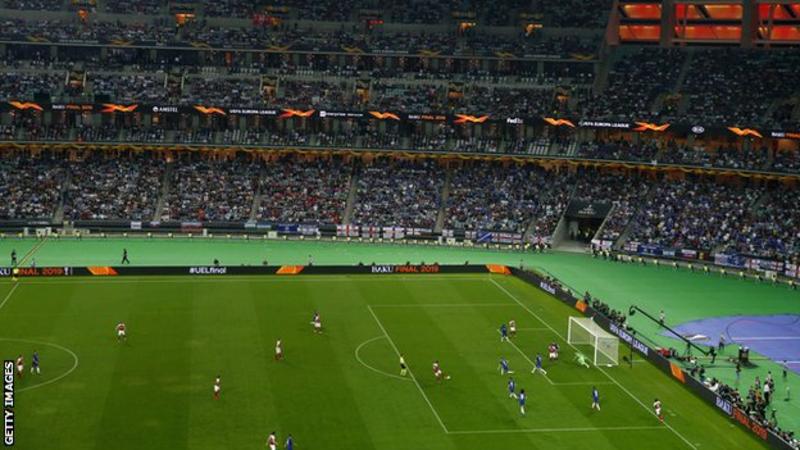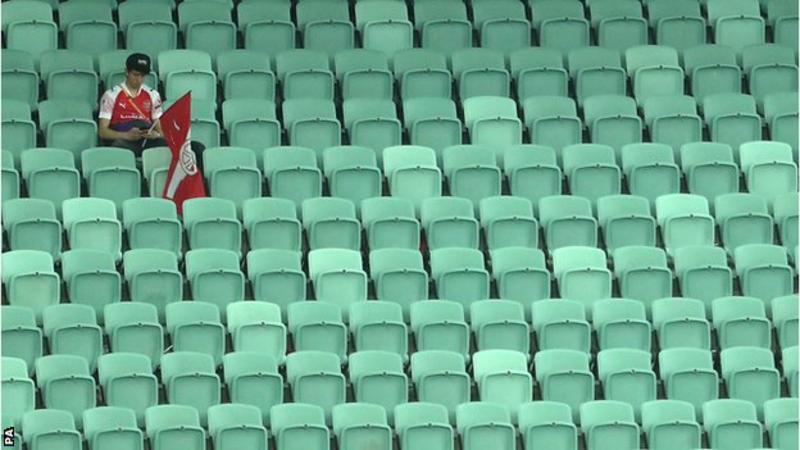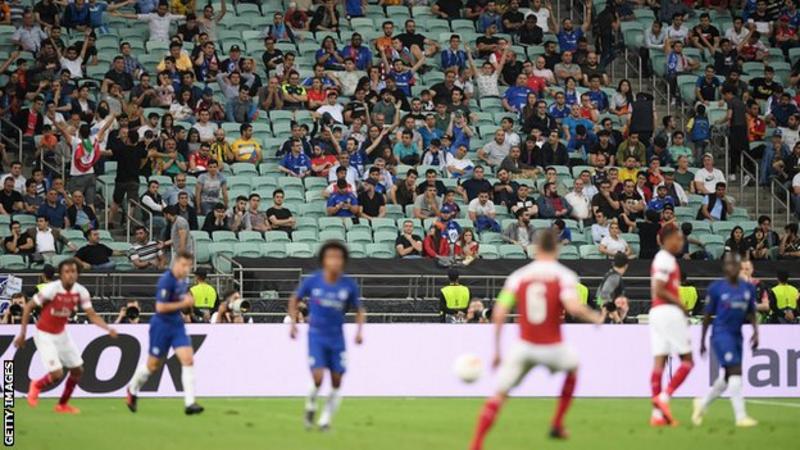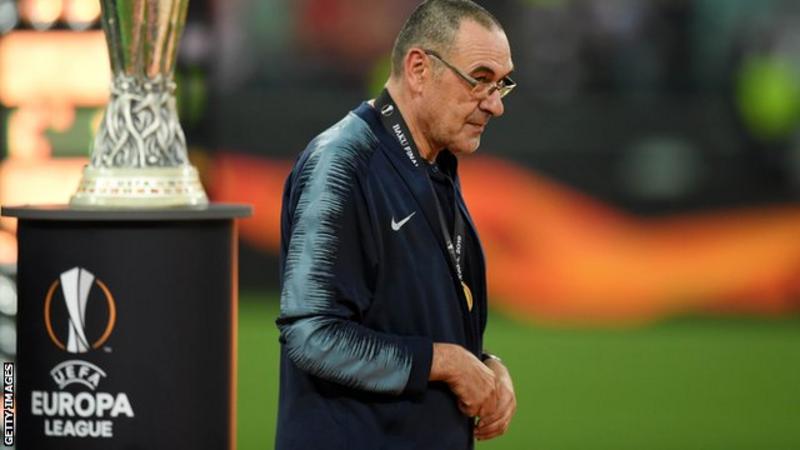Europa League final in Baku: Far from the pitch and a long way from home – the surreal final
The next time Uefa wants to take a showpiece club final to a new footballing outpost, they could always try the moon.
It cannot be that much more inaccessible than Baku proved to be for UK-based Chelsea and Arsenal fans, and the atmosphere will surely be better than it was at the half-empty Olympic Stadium on Wednesday too.
Things did improve as a spectacle once the star man, Eden Hazard, who decided to put his stamp on proceedings, but until then it seemed that this would be a final that reflected its build-up – unhappy, and strangely surreal.
One of the few chants before half-time that could be heard echoing across the covered-up athletic track that forms the perimeter of the pitch came from the pocket of Chelsea fans who had travelled the 2,500 miles to get here.
It was directed at Uefa, contained an obscenity and asked: ‘Is this what you want?’
- Match report: Chelsea beat Arsenal in Baku
- Chelsea win Europa League – reaction and analysis
- ‘I think it’s a goodbye’ – Hazard hints at Chelsea exit
- How you rated the Chelsea & Arsenal players
Like everyone else inside the stadium or watching – from an extreme wide angle – on TV around the world, they were witnessing what appeared to be a pale imitation of a Premier League match, played at pre-season pace.
The backdrop of rows of empty seats seemed distant and strangely detached from proceedings. So did most of the players.
There were familiar faces on both teams, but we were seeing them in an alien environment – a long way from home.
It made for an unforgettable final, but sadly for mostly the wrong reasons.
Fans forced to improvise to get to Baku
Only a total of about 5,000 home-based supporters had followed Chelsea and Arsenal to Azerbaijan, with the Blues sending almost half of their allocation back unsold.
They were deterred by high prices and how long it takes to get here, and also the fact that it is difficult to access Baku even if you have both time and money on your hands.
A lack of direct flights led to some inventive and long-winded routes to reach this beautiful port on the Caspian Sea, and fans who had made it were happy to share their stories as they basked in the sunshine before the final.
Some had come by plane, some by train and even some by taxi – a 600km trek from Tbilisi in neighbouring Georgia to be exact. All of them deserved credit for their efforts.
But, even before the game, there seemed relatively few of them about.
Arsenal fans were here with their flags in greater numbers and took over a street of bars near the city’s famous Fountains Square in traditional ‘fans abroad’ style – good natured, and loud.
The Gunners sang constantly – mostly about themselves or Tottenham, but also included more anti-Uefa chants. They did not feel fans were put first – or indeed anywhere near the front – when plans for the final were made.
Chelsea supporters were harder to find, but they all agreed with those sentiments.
They are also used to commandeering city squares for major European finals – think Munich for the 2012 Champions League final, or Amsterdam for the 2013 Europa League final.
This time they were scattered and could seemingly barely fill a pub on their own, even the ones they had been allocated. The occasion seemed somewhat diminished for it.
Global fans and enthusiastic locals – just a shame about the game
The location was not a drawback for everyone, of course. There were fewer UK-based fans attending this final than usual, but there seemed to be many more from around the world.
There was the Georgian Arsenal fan who had spent £5 to get a bus across the border, the Chelsea fan from Mexico who had set off the previous week, and the family of Arsenal fans from Dubai.
For most of them, this was a real-life ‘Game 39’. Two Premier League teams, playing a competitive match closer to home, outside of the UK and with silverware at stake.
The locals, too, seemed genuinely happy to have a big match and two sets of fans on their doorstep, and appeared desperate to impress.
It was just a shame about the game itself, really, especially from Arsenal’s point of view.
If, as some of the Gunners players had declared in the build-up, that they were playing for missing team-mate Henrikh Mkhitaryan – who was unable to play because of security reasons – then they did not show it.
They also did not demonstrate much, if any, of the extra motivation they had talked beforehand of having because a Champions League place was on the line.
If the final was a non-event for the first 45 minutes, Arsenal were a no-show for most of the 90, and the result reflected that.
Their reward is to return to this competition next season, for a third straight year.
The 2020 final is in Gdansk, Poland, so at least they will not have to travel so far next time, providing they make it of course.
Chelsea face uncertain future with or without Sarri
Chelsea will travel home with the trophy but arguably a more uncertain future too.
Their best player, Hazard, is almost certainly leaving this summer and it looks increasingly likely that Sarri will depart too.
Despite a turbulent first season under the Italian Chelsea finished third in the Premier League, won a fifth European title and reached the final of the Carabao Cup too.
With or without him, they might have to deal with a transfer ban as they try to build on that success.
Back in Baku, building is one of the things they do a lot of in this oil-rich country – dozens of gleaming new glass towers rise above the older parts of the city and more are under construction.
The largely hostile response to them hosting this final is not going to change that, or the city’s future as a major sporting venue.
Big games are coming back here next summer as part of Euro 2020’s sprawl across the continent, with three group games and a quarter-final being held at the Olympic Stadium.
If you’re planning to attend any of them, I would book your flights now. Otherwise, you should probably get used to that distant wide-angle view.
Source: Read Full Article



